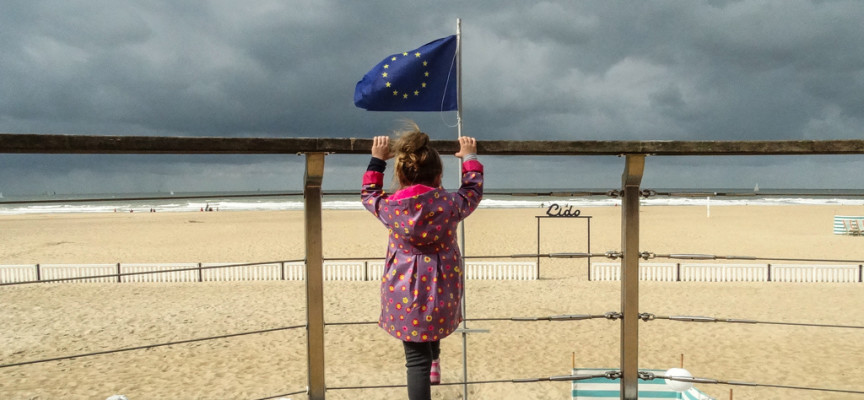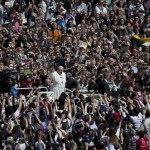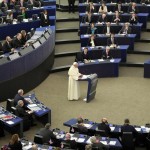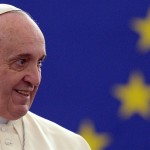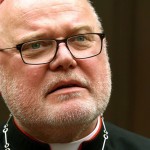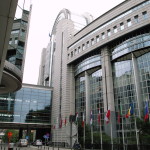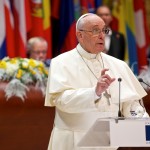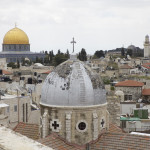“To the rebirth of a Europe weary, yet still rich in energies and possibilities, the Church can and must play her part. Her task is one with her mission: the proclamation of the Gospel, which today more than ever finds expression in going forth to bind the wounds of humanity with the powerful yet simple presence of Jesus, and his mercy that consoles and encourages. God desires to dwell in our midst, but he can only do so through men and women who, like the great evangelizers of this continent, have been touched by him and live for the Gospel, seeking nothing else. Only a Church rich in witnesses will be able to bring back the pure water of the Gospel to the roots of Europe”.
Perhaps this is exactly the “dream” that Pope Francis made the foundation of all his “dreams” about Europe told May 6th on receiving the Charlemagne Prize at the Vatican.
Citing the Evangelist John, he added that in the perspective of rebirth of the old continent, “the path of Christians towards full unity is a great sign of the times and a response to the Lord’s prayer “that they may all be one” (Jn 17:21)”.
Striking and challenging the image of the witnesses that irrigate the roots of Europe with the water of the Gospel so that they can give life again, can give hope and future for its peoples and all humanity.
Francis has listed many “dreams” in his speech to the highest representatives of the European institutions and of several national governments with the desire to offer an encouragement not to waste the inheritance received “from the insightful plans left by the original builders”.
And also an invitation to resume the construction of “a Europe, that rather than protecting spaces, is called to be a mother who generates processes”.
The “dreams” of Pope Francis can only be understood if you subtract them to emotional, psychological astrological interpretations.
It is not the first time that he has talked about this, making people understand that the “dream” is not an escape from reality or an inconclusive abstractness, but it means having large visions, large horizons, great destinations.
A statement by Maria Romana De Gasperi comes to our mind, when she said that his father “was not a dreamer but he had a dream.”
So were Robert Schuman and Konrad Adenauer, that at the time of the reconstruction after World War II, were convinced, as Francis is, that “our problems can become powerful forces for unity”.
Europe can therefore come out from the crisis in which it has been struggling for a long time. It is also necessary “to realize a memory transfusion”, not a nostalgic return to the past but a leap forward of the thought, spirit and passion of the Fathers.
The pope then invited to update the idea of Europe to reach “a Europe capable of giving birth to a new humanism based on three capacities: the capacity to integrate, the capacity for dialogue and the capacity to generate”.
Right here emerges the historical task of European Christians who are called to mark the difference between a realism that is not subject to complexity but with courage governs it and a pessimism that surrenders to difficulties, often becoming prisoner of it out of fear.
The risk of stiffening and misunderstanding is obvious.
For this reason the Pope invites to arm ourselves and to arm young people in particular “with the weapons of dialogue”. And with pragmatism he adds that: “This culture of dialogue should be an integral part of the education imparted in our schools, cutting across disciplinary lines and helping to give young people the tools needed to settle conflicts differently than we are accustomed to do”.
The “dream” of Pope Francis results in a call that with secular language concludes his speech: “I dream of a Europe of which it will not be said that its commitment to human rights was its last utopia”.
Getting lost in the nightmare of walls or identifying with the “dream” of bridges? Europe’s response cannot delay.
“Alla rinascita di un’Europa affaticata, ma ancora ricca di energie e di potenzialità, può e deve contribuire la Chiesa. Il suo compito coincide con la sua missione: l’annuncio del Vangelo, che oggi più che mai si traduce soprattutto nell’andare incontro alle ferite dell’uomo, portando la presenza forte e semplice di Gesù, la sua misericordia consolante e incoraggiante. Dio desidera abitare tra gli uomini, ma può farlo solo attraverso uomini e donne che, come i grandi evangelizzatori del continente, siano toccati da Lui e vivano il Vangelo, senza cercare altro. Solo una Chiesa ricca di testimoni potrà ridare l’acqua pura del Vangelo alle radici dell’Europa”.
Forse è proprio questo il “sogno” che papa Francesco ha posto a fondamento di tutti gli altri suoi “sogni” sull’Europa raccontati il 6 maggio nel ricevere in Vaticano il Premio Carlo Magno.
Citando l’evangelista Giovanni, ha aggiunto che nella prospettiva di rinascita del vecchio continente “il cammino dei cristiani verso la piena unità è un grande segno dei tempi, ma anche l’esigenza urgente di rispondere all’appello del Signore ‘perché tutti siano una sola cosa’”.
Suggestiva e impegnativa l’immagine dei testimoni che irrigano con l’acqua del Vangelo le radici dell’Europa perché tornino a dare vita, a dare speranza, a dare futuro ai suoi popoli e all’umanità intera.
Sono molti i “sogni” che Francesco ha elencato nel suo discorso ai massimi rappresentanti delle istituzioni europee e di diversi governi nazionali con il desiderio di offrire un incoraggiamento a non disperdere l’eredità ricevuta “dall’illuminato progetto architettato dai Padri”. E anche un invito a riprendere la costruzione di “un’Europa che lungi dal proteggere spazi si renda madre generatrice di processi”.
I “sogni” di papa Francesco si possono comprendere solo se si sottraggono a interpretazioni emotive, psicologiche, astrologiche.
Non è la prima volta che ne parla facendo comprendere che il “sogno” non è una fuga dalla realtà oppure un’astrattezza inconcludente, ma è avere grandi visioni, grandi orizzonti, grandi mete.
Torna alla mente un’affermazione di Maria Romana De Gasperi, che di suo padre Alcide diceva: “Non era un sognatore ma aveva un sogno”.
Così erano Robert Schuman e Konrad Adenauer, che nel tempo della ricostruzione dopo la seconda guerra mondiale erano convinti, come lo è Francesco, che “le difficoltà possono diventare promotrici potenti di unità”.
Dalla crisi, di cui si dibatte da molto tempo, l’Europa può dunque uscire. È anche necessario “realizzare una trasfusione di memoria”: non un nostalgico ritorno al passato ma uno slancio in avanti del pensiero, dello spirito e della passione dei Padri.
Il Papa invita quindi ad aggiornare l’idea di Europa per giungere a “un’Europa capace di dare alla luce un nuovo umanesimo basato su tre capacità: la capacità d’integrare, la capacità di dialogare e la capacità di generare”.
Proprio qui emerge il compito storico dei cristiani europei, che sono chiamati a segnare la differenza tra un realismo che non soggiace alla complessità ma con coraggio la governa e un pessimismo che si arrende alle difficoltà diventandone, spesso per paura, prigioniero.
Il rischio di irrigidimenti e incomprensioni è evidente.
Per questo il Papa invita ad armarsi e ad armare i soprattutto i giovani “con le armi del dialogo”. E con concretezza aggiunge che “questa cultura del dialogo dovrebbe essere inserita in tutti i curricula scolastici come asse trasversale delle discipline, aiuterà a inculcare nelle nuove generazioni un modo di risolvere i conflitti diverso da quello a cui li stiamo abituando”.
Il “sogno” di papa Francesco si traduce in un appello che, con linguaggio laico, conclude il discorso: “Sogno un’Europa di cui non si possa dire che il suo impegno per i diritti umani è stato la sua ultima utopia”.
Perdersi nell’incubo dei muri o ritrovarsi nel “sogno” dei ponti? La risposta dell’Europa non può tardare.
Paolo Bustaffa
Latest posts by Paolo Bustaffa (see all)
- Europe in Aldo Moro’s project - 31 dicembre 2016
- Ventotene: a cultural alliance between generations is urgent for the EU - 3 settembre 2016
- That flag in the Wyd - 7 agosto 2016

